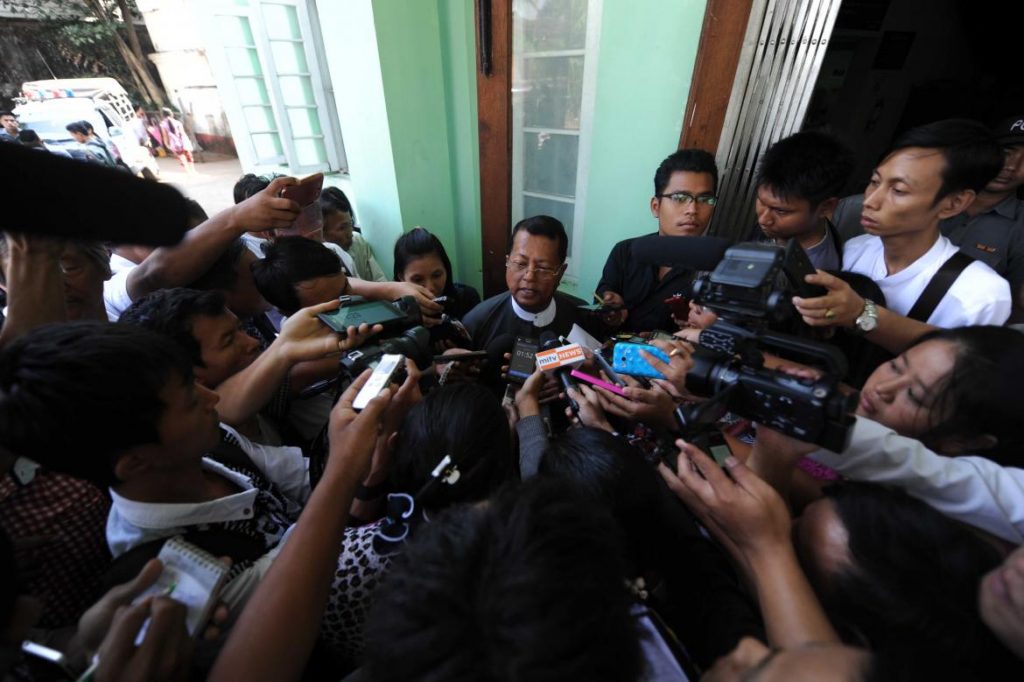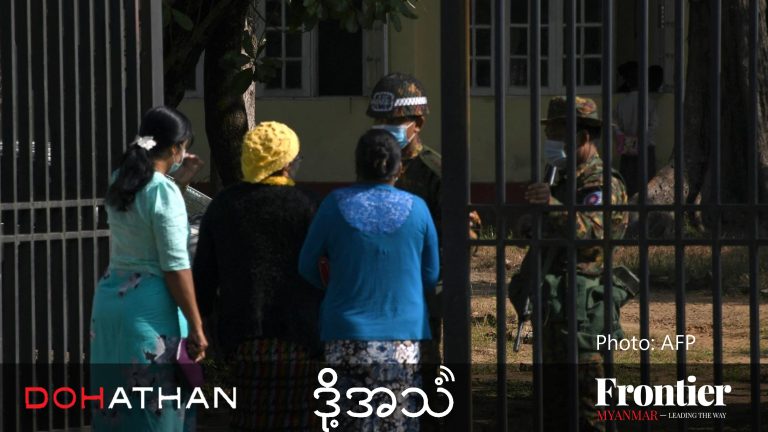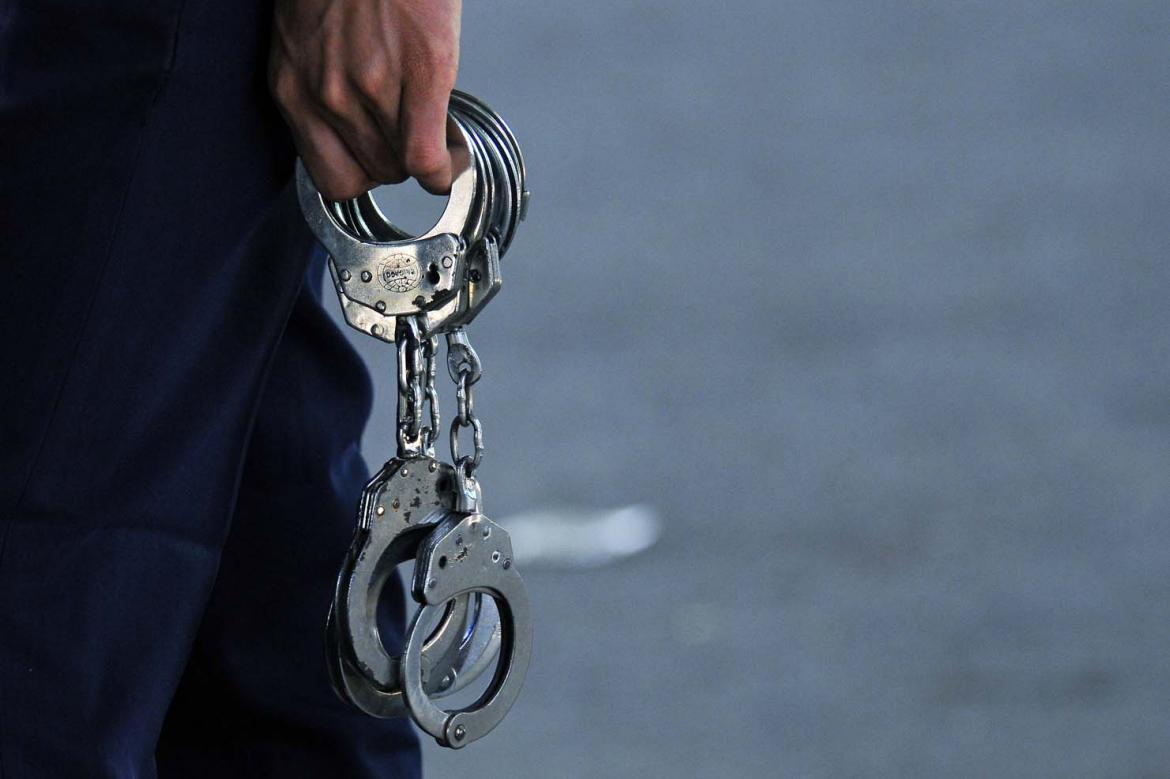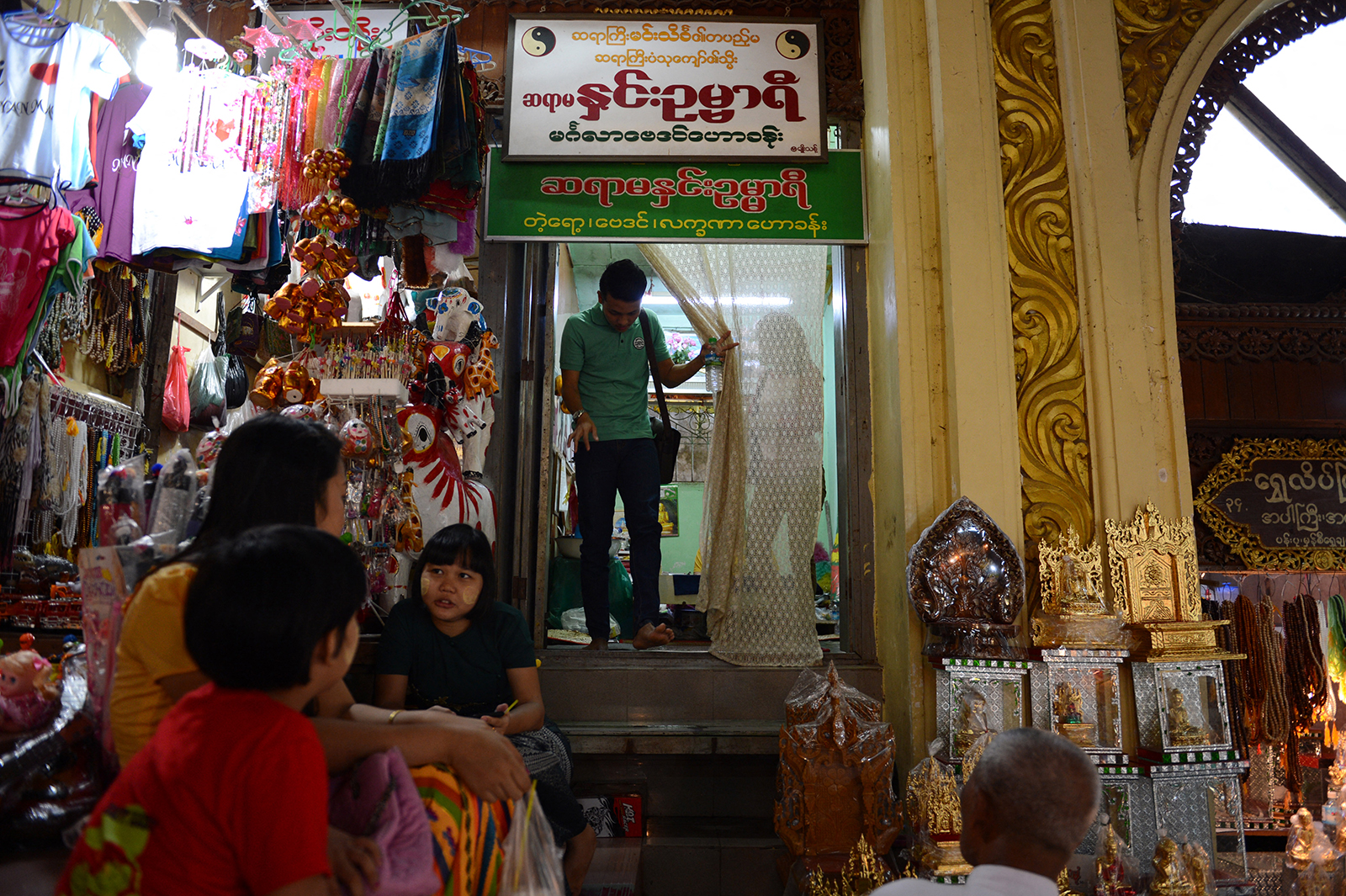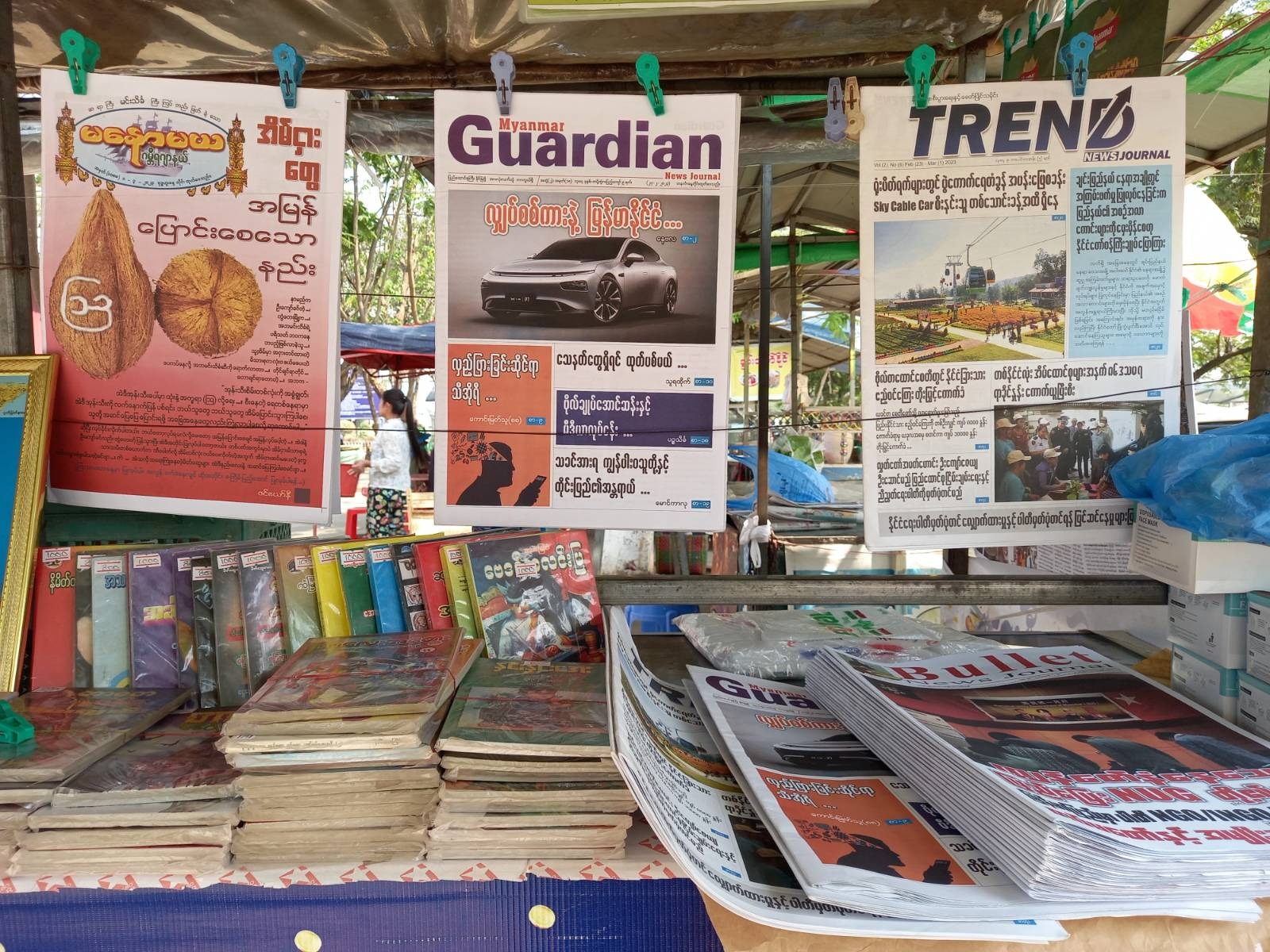Journalists, as members of the public, have a constitutional right to attend court hearings but they are being denied access by over-zealous clerks and judges with an aversion to scrutiny.
By SU MYAT MON | FRONTIER
UNCOOPERATIVE CLERKS, an apparent aversion to public scrutiny among the judiciary and demanding reporters are contributing to misunderstandings between journalists and judges over the right of the news media to cover court cases.
Section 19(b) of the 2008 Constitution and a media handbook published by the Supreme Court in 2015 make clear that justice is to be dispensed in open courts. Section 4(d) of the 2014 Media Law says news media workers are entitled “… to enter into certain offices, departments and organisations in accordance with the regulations of relevant departments or organisations”.
Journalists complain that judges are either not aware of the Media Law or deliberately ignore it, and that when access is denied to a court, a reason is rarely given.
The situation has contributed to a poor relationship between court officials and journalists, said lawyer U Than Zaw Aung, secretary of the Myanmar Media Lawyers’ Network.
Support more independent journalism like this. Sign up to be a Frontier member.
Media groups have organised workshops on the issue and invited officials from the Office of the Union Attorney General but they declined to attend, Than Zaw Aung told Frontier.
Judges needed to be aware of the right of journalists to cover trials in line with the law, he said.
“The main problem is the judicial pillar is afraid of the media sector,” he said, adding that this was linked to bribery and corruption.
Than Zaw Aung said another problem was the weakness of the Ministry of Information and the Myanmar Media Council in representing the interests of journalists, including the right to cover court cases.
“There is no need for the government to use the judicial pillar as a cattle prod like it was used under the military government,” he said.
Myanmar Media Council member U Myint Kyaw said some government officials did not know there was a Media Law.
“The judiciary is not independent because it is still [being influenced by] the Ministry of Home Affairs,” Myint Kyaw said.
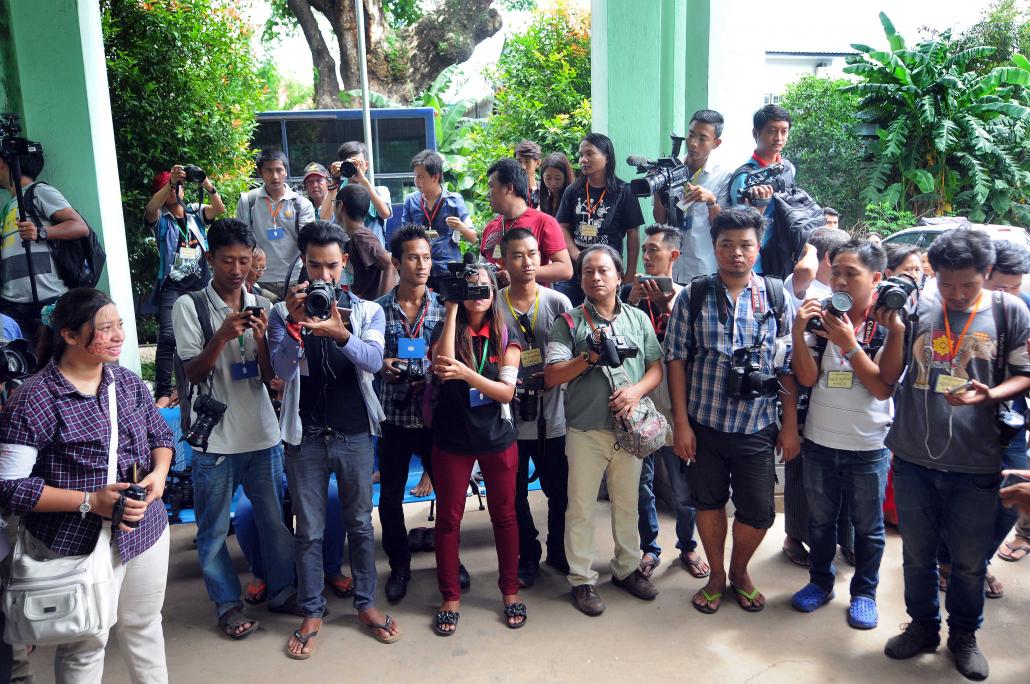
Media wait outside a courtroom in Bahan Township during the defamation trial of two journalists. (Steve Tickner | Frontier)
U Ngai Sak, a former township judge in Yangon’s Kyauktada Township, said journalists provided an essential public information role when they were able to cover court cases.
“It is important that journalists have access to courts to cover cases in the public interest,” he told Frontier.
Restrictions imposed on journalists by courts were because of worry and fear among judges about making mistakes that they did not want publicised, he added.
Courts must be transparent to uphold the dignity and respect of the judicial pillar, Ngai Sak said.
“At the moment, as there is no transparency, it can be said there might be something hidden,” he said.
He said the National League for Democracy government needed to work harder to achieve media freedom, which was a standard for democracy in the international community.
Ngai Sak said he worried that the judiciary under the NLD government was getting worse rather than getting better.
“Even under the democratic government, I have to question whether [officials] are holding their position in the judicial sector and using it for their own advantage,” he said, citing the rising number of online defamation cases filed under section 66(d) of the Telecommunications Law.
Ms Kari Rotkin, an American lawyer and an international legal adviser for London-based group Justice Base, has written reports and provided training in Myanmar on fair trial rights, court monitoring and public access to courts. She was involved in producing a Justice Base report on fair trial rights in Myanmar released on October 2.
Rotkin said many people in Myanmar lacked trust in the judiciary’s capacity to administer fair trials.
“Excluding the public, including journalists, doesn’t solve this problem – it exacerbates it. Open courts can help develop public trust in the judicial system and legitimise the government,” she told Frontier.
Rotkin said Myanmar law only permitted judges to exclude individuals from courthouse premises and courtrooms for limited reasons.
“Yet Justice Base’s research showed that most of the time non-judicial court staff, such as clerks and police officers, were making decisions concerning whether someone was allowed inside or not. This is concerning, and judges should make sure that such decisions are only made by them in accordance with law,” she said.
“Under Myanmar law, everyone has a right to a public hearing,” said Rotkin.
“This is true even if you don’t have a connection to a particular hearing inside, yet Myanmar court staff often question why a journalist – or anyone else – wants to enter the courthouse or courtroom. This practice must stop.”
A case study in denied access
Most Myanmar journalists have stories about being denied entry to courtrooms or court premises by zealous officials.
In some cases the officials are ignorant about the right of access and in others they are enforcing a ban on photographing or filming court proceedings. Similar bans apply in many countries and are the reason why media companies often hire artists to draw courtroom scenes during big trials.
Ko Ye Mon Tun, a reporter with DVB, ran into problems when he wanted to take a camera into the Yangon High Court on September 18 during the trial on corruption charges of former Kayin State government secretary, U Pyone Cho.
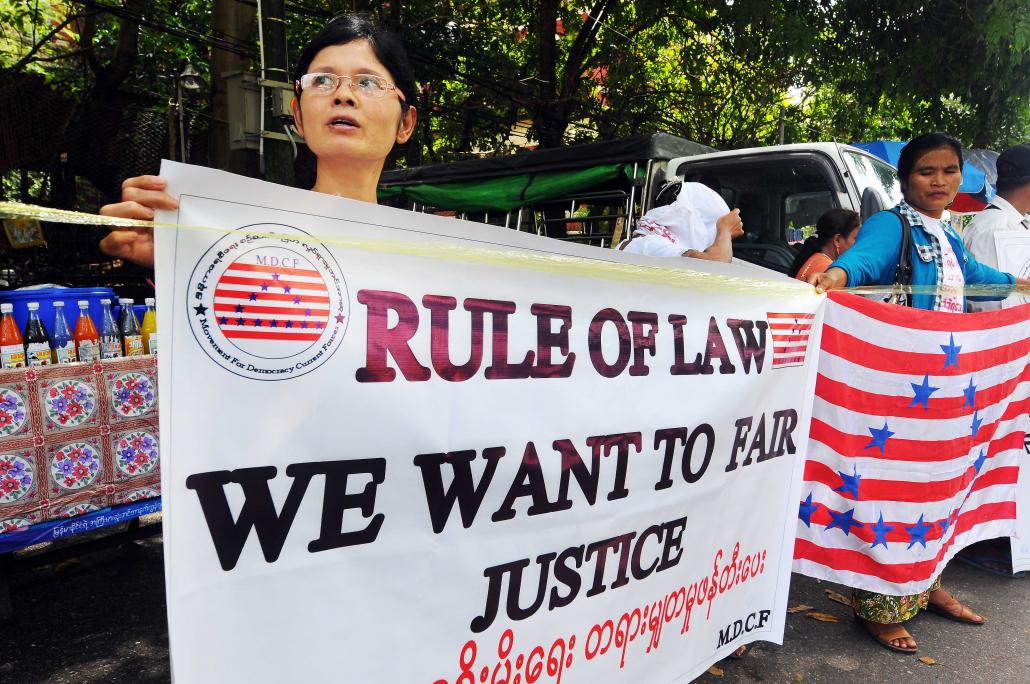
A rule of law protest in Yangon. (Steve Tickner | Frontier)
Security officials insisted that no photos be taken within 500 yards of the court, he said.
“I had a camera with me and was asked to leave the camera outside; there was no compromise and I couldn’t put it in my bag,” Ye Mon Tun said.
“It was not safe for us to leave our stuff, so we chose to leave the court,” he told Frontier.
“So it was like deliberately restricting access and might have been because the case was quite big news,” he said.
Ye Mon Tun acknowledged that a Handbook for Media Access to the Courts published by the Supreme Court in 2015 says that audio recorders, cameras and mobile phones must not be taken into courtrooms while cases were being heard. The handbook also stipulates that photos or videos must not be taken “at the place of criminal proceedings by any ways and means”.
But from the gate into the court, the security did not allow the journalists to enter he said, adding “it is unclear whether understood the role of journalists or do not know how [the role of a journalist] functions”.
Ye Mon Tun said denying journalists, and the public, the right to attend court hearings might create suspicion about the way a case was handled.
Not confident that his goods would be secure if left outside the court, Ye Mon Tun tried to negotiate with officials to leave his camera inside his bag throughout court proceedings, but was denied access entirely.
“The problem behind this restriction was that no reason was given,” he said.
Ko Htet Khaung Lin, a reporter for Myanmar Now, said being denied access to court hearings was a big problem for journalists.
He said reporters understood that they could not take photos in courtrooms during hearings but wondered why they were denied access to court compounds if they had cameras.
It’s a problem that especially affects video journalists, Htet Khaung Lin said, adding: “It’s like we have to draw pictures instead of taking photos.”
TOP PHOTO: Steve Tickner | Frontier


